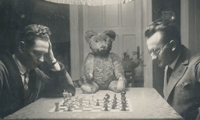 Eighth Gwangju Biennale Announces Title and Dates
Eighth Gwangju Biennale Announces Title and DatesYdessa Hendeles, Partners (The Teddy Bear Project), 2002 Courtesy of the Ydessa Hendeles Art Foundation.
GWANJU.- The Gwangju Biennale Foundation and Director Massimiliano Gioni announced the eighth edition of the Gwangju Biennale, opening September 3, 2010. Titled 10,000 Lives, the Biennale will develop as a sprawling investigation of the relationships that bind people to images and images to people. With works by more than 100 artists, realized between 1901 and 2010, as well as several new commissions, the exhibition will be configured as a temporary museum in which both artworks and cultural artifacts are brought together to compose a idiosyncratic catalogue of figures and icons, faces and masks, idols and dolls.
Encompassing a diverse range of media, with a particular emphasis on portraiture, the exhibition will engage our obsession with images, and our need to create substitutes, effigies, avatars and stands-in for ourselves and our loved ones.
“The history of art is largely one of people looking at people, of eyes staring at bodies, of objects and figures created as surrogates of ourselves” explained director Massimiliano Gioni. “From ancient mythology we learn that images were created to capture the shadow of lovers. Images are the children of nostalgia: they keep us close to our dear ones, and keep them alive. It is this perennial state of iconophilia, this maniacal love of images, that we wish to examine in Gwangju.”
The exhibition title is borrowed from Maninbo (10,000 Lives), a yet-unfinished 30 volume epic poem conceived by Korean author Ko Un while imprisoned in 1980 for his participation in the South Korean democratic movement. Held in solitary confinement, as a means to preserve his sanity, Ko envisioned a poem which described every single person he had met throughout his life, including historical figures and fictional characters encountered in literature. Upon his release he began writing the 3,800 poems that compose Maninbo (10,000 Lives), a magnum opus that reads as a personal encyclopedia of humanity.
Unfolding as a family album, the Eighth Gwangju Biennale will look at images as sites of affection and means of survival. The exhibition will also examine how images are fabricated, circulated, stolen and exchanged: it will interrogate their power, while trying to capture their many lives.
A complete list of artists, programming and venues will be announced in April 2010.
 Eighth Gwangju Biennale Announces Title and Dates
Eighth Gwangju Biennale Announces Title and Dates